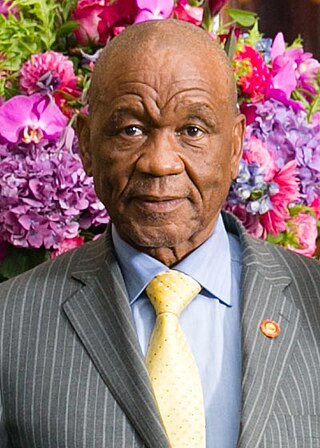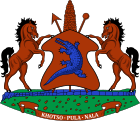
The history of people living in the area now known as Lesotho goes back as many as 400 years. Present Lesotho emerged as a single polity under King Moshoeshoe I in 1822. Under Moshoeshoe I, Basotho joined other clans in their struggle against the Lifaqane associated with famine and the reign of Shaka Zulu from 1818 to 1828.

Bethuel Pakalitha Mosisili is a former Mosotho politician who was the fourth prime minister of Lesotho from May 1998 to June 2012 and again from March 2015 to June 2017. He led the Lesotho Congress for Democracy (LCD) to a near-total victory in the 1998 election, and under his leadership the party also won majorities in the 2002 and 2007 elections. While serving as Prime Minister, Mosisili was also Minister of Defence.

The Lesotho Congress for Democracy (LCD) is a political party in Lesotho.

Thomas Motsoahae Thabane is a Mosotho politician who was the fifth Prime Minister of Lesotho from 2012 to 2015 and from 2017 to 2020. He founded the All Basotho Convention (ABC) in 2006 and led the party until 2022.
Monyane Moleleki is a Mosotho politician who served as a Deputy Prime Minister of Lesotho, as well as Minister of Parliamentary Affairs, from 2017 to 2020. As a leading figure in the Lesotho Congress for Democracy (LCD), Moleleki was Minister of Natural Resources from 1993 to 1994, Minister of Information from 1996 to 1998, Minister of Natural Resources from 1998 to 2004, Minister of Foreign Affairs from 2004 to 2007, and Minister of Natural Resources from 2007 to 2012. After breaking with the LCD, Moleleki served as Deputy Leader of the Democratic Congress and was Minister of Police from 2015 to 2016. He left the Democratic Congress and launched a new party, the Alliance of Democrats, in 2017.

Ntlhoi Motsamai is a Lesotho politician who served as the first female Speaker of the National Assembly from 1999 to 2012. She was elected again from March 2015 to June 2017. Motsamai worked as a teacher before entering politics.

General elections were held in Lesotho on 17 February 2007. They had originally been scheduled to be held in April or May 2007. In October 2006, Tom Thabane left the ruling Lesotho Congress for Democracy (LCD) and formed a new party, the All Basotho Convention (ABC), and 17 other members of parliament joined him. This left the LCD with a narrow majority of 61 out of 120 seats. On the advice of Prime Minister Pakalitha Mosisili, King Letsie III dissolved parliament on November 24, 2006, and the election was scheduled for February 17, 2007. The bringing forward of the date caused dissatisfaction amongst the opposition, which expressed concern that it would not allow sufficient time for campaigning and electoral preparations. It was believed that the election was called early due to the possibility that there would be further defections from the LCD, depriving it of its majority.

The All Basotho Convention is a political party in Lesotho. The party was formed in October 2006 and founded by Tom Thabane, a former minister in the Lesotho Congress for Democracy (LCD) led by the government of Prime Minister Pakalitha Mosisili. Nkaku Kabi has led the party since February 2022.
Pontso S. M. Sekatle is a politician and academic in Lesotho. Sekatle lectured at the National University of Lesotho from 1984 to 2001. In June 2001, she was appointed to the Senate of Lesotho, and on July 6, 2001 she became Minister of Health and Social Welfare. She was a member of the Qacha's Nek constituency for third time with the win in the elections in 2012 and was appointed the Minister of Local government and Chieftainship Affairs.
Dominic Motikoe was a Basotho politician who led the National Independent Party (NIP) and served as a Member of Parliament in the National Assembly of Lesotho until his death in 2009.

The Democratic Congress is a political party in Lesotho that split from the Lesotho Congress for Democracy. It is led by Mathibeli Mokhothu.

On 30 August 2014, Lesotho's Prime Minister Tom Thabane alleged that a coup d'état had been launched against him. This followed a previous allegation which caused him to suspend parliament over possible extra-constitutional manoeuvres. It also followed pressure from South Africa to maintain the democratic process. The next day, Deputy Prime Minister Mothetjoa Metsing assumed responsibility for running the government. An early election was held in February 2015 as a result of South African-led Southern African Development Community (SADC) mediation, giving power to the opposition.

General elections were held in Lesotho on 28 February 2015 for all 120 seats of the National Assembly, the lower house of the Parliament of Lesotho, more than two years ahead of schedule due to the 2014 political crisis. Following mediation facilitated by the Southern African Development Community (SADC), King Letsie III on the advice of the incumbent Prime Minister Tom Thabane, dissolved the Eighth Parliament and called a snap election.

Mothetjoa Metsing is a former Deputy Prime Minister of Lesotho. He is a member and current leader of the Lesotho Congress for Democracy (LCD). He served in the government of Prime Minister Tom Thabane between 2012 and 2015. In 2014, he was involved in controversy over an alleged coup attempt against the prime minister that was eventually resolved over calls for an early election.

Early general elections were held in Lesotho on 3 June 2017 to elect all 120 seats of the National Assembly, the lower house of the Parliament. The elections were called more than three years ahead of schedule due to a successful vote of no confidence against the incumbent Prime Minister Pakalitha Mosisili.

The Alliance of Democrats is a political party in Lesotho.
Mathibeli Edwin Mokhothu is a Mosotho educator and politician who served as the Deputy Prime Minister of the Kingdom of Lesotho, as well as the Minister of Parliamentary Affairs, from 2020 to 2022. A member of the Democratic Congress, he is the party's leader and previous deputy leader. He was formerly the Leader of the Opposition in the National Assembly before the party formed part of a coalition with the All Basotho Convention in May 2020. From 2015 to 2017, he served as the Minister of Gender, Youth, Sports and Recreation. Mokhothu is the MP for the Qhoali No. 68 constituency.
Mathabiso Angeline Lepono is a Mosotho politician. She was a longtime minister of gender, youth, and sports under Lesotho's prime minister Pakalitha Mosisili.
General elections were held in Lesotho on 7 October 2022 to elect all 120 members of the National Assembly, the lower house of Parliament.











